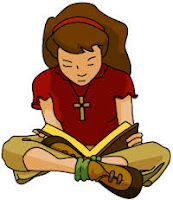Today I read Matthew, chapter 4, in my NIV Life Application
Study Bible, which describes Satan’s temptation of Jesus in the desert as well
as the beginning of Jesus’ ministries in Galilee.
Matthew 4:1-11 is all about Satan tempting Jesus, who had
been fasting in the desert for 40 days and 40 nights. Jesus was tired and
hungry, and Satan tempts Jesus to use his divine powers and turn stones into
bread. Jesus says no, that God will sustain him. Then Satan tempts Jesus to
prove who he is by jumping from the highest point in the temple. Satan said if
Jesus really is the Son of God, he won't be hurt. God will save him.
Jesus says no, that we are not to put God to the test. Satan’s final temptation
was telling Jesus that if Jesus would only follow him, Satan would make him
rich and give him land. Jesus again says no, that we are to worship only God.
Matthew 4:12-22 describes Jesus calling his first disciples,
Simon called Peter and his brother Andrew, and two more brothers, James and
John, to follow him. All four men had known Jesus previously from his time in
Galilee. They had heard him preach and knew who he was and what he wanted. They
followed immediately.
The end of this chapter, Matthew 4:23-25 describes Jesus’ ministry
in Galilee. He taught, he preached to, and he healed the people who came to see
him—some of whom came from very far away.
Lots of little things struck me in this chapter. First of
all, Satan didn’t come to Jesus when he was well and well fed and strong. Satan came
to Jesus when he was tired and weak and hungry—that’s when he tempted Jesus.
That struck a chord in me. Of course Satan would choose that time. It reminded
me that I have to be strong even when I feel as though I can’t be—God is with
me then too.
Another thing that resonated with me was the way that Satan
quoted Scripture during his attempts to tempt Jesus. I didn’t include that in
my summary above, but Satan knows his Old Testament, and he used part of it in
a way to try to convince Jesus that giving in to the temptation would actually
be following God’s word in the Bible. I’ve definitely dealt with this in my own
life: I’ve known people, and heard people in the public eye, quote the Bible to
suit their purposes. They twist Scripture, or they take it out of context to
support what they want you to believe or to do. It makes me doubly glad that I’m
reading the Bible now for myself.
And finally, the other thing that struck me was the way the
first four disciples dropped what they were doing—their daily jobs—to follow
Jesus. They didn’t hem haw around. They just followed. Imagine that: leaving
your job to follow Christ because he asked you too, putting all your faith in
him like that. I’m trying to follow him in my daily life, but I question every
single day if I’m doing it right.
As Jesus was walking
beside the Sea of Galilee, he saw two brothers, Simon called Peter and his
brother Andrew. They were casting a net into the lake, for they were fishermen.
“Come, follow me,” Jesus said, “and I will make you fishers of men.” At once
they left their nets and followed him (Matt. 4:18-20).





